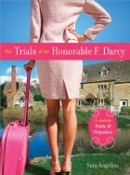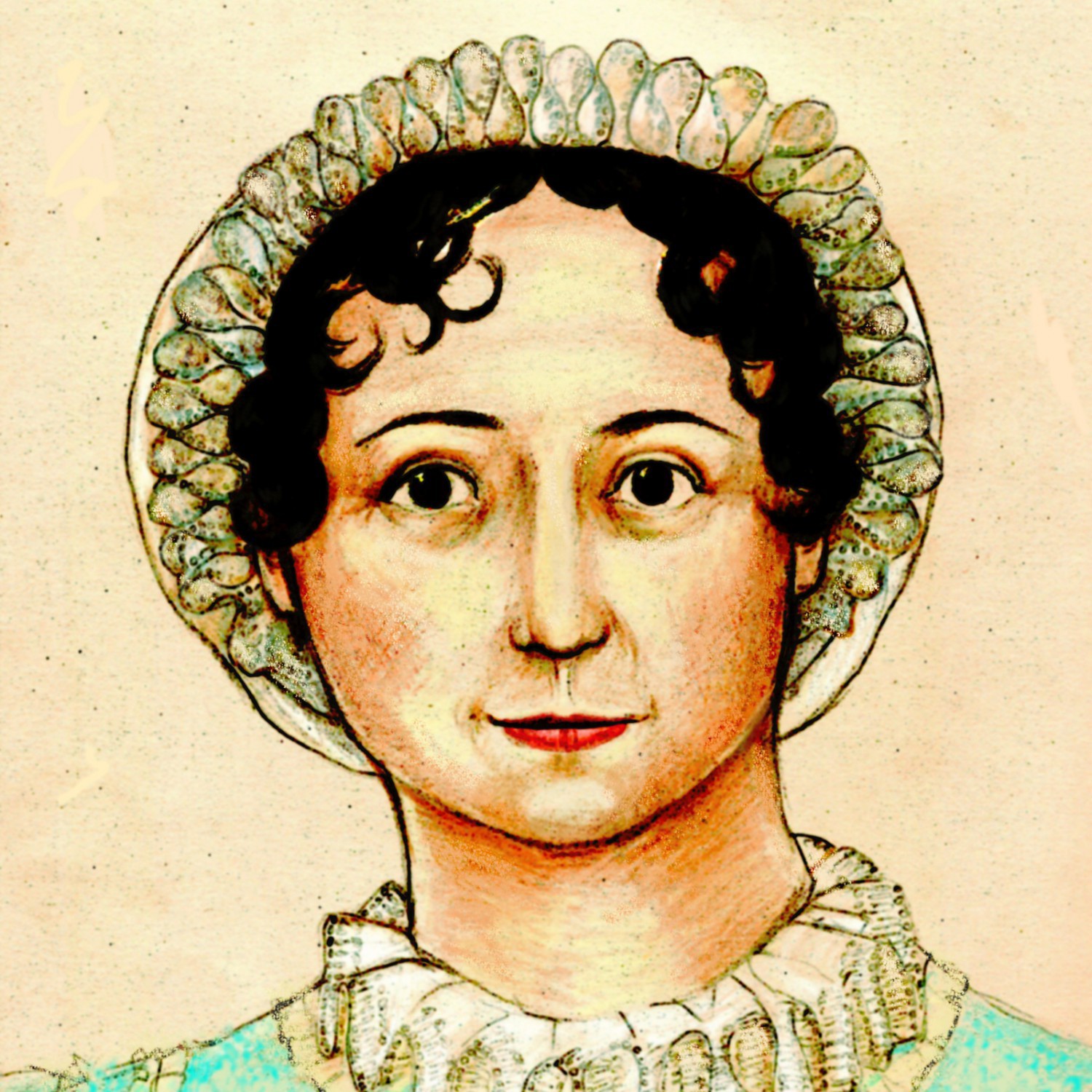 Review by Allison T.
Review by Allison T.
Their attraction is so hot, it should be against the law! trumpets the publisher’s blurb on Sara Angelini’s The Trials of the Honorable F. Darcy; A modern Pride & Prejudice. Meet Elizabeth Bennet, a “fresh-faced,” sassy trial attorney, who takes a dislike to Judge Fitzwilliam Darcy, a wealthy British landowner who, thanks to an American mother, holds dual citizenship and thus can be a judge in the California town of Meryton.
The Trials is a steamy romance (and if you don’t know what the code-word “steamy” means, you probably won’t like this book). When Lizzie suggests to her friends that the Hon. F. Darcy’s middle initial should be a “U,” this gives you a pretty good sense of the language used freely in the book. (The graphic sex starts on page 102, for readers interested in skipping ahead.)
Judge Darcy finds himself drawn to Elizabeth despite her apparent dislike for him. To make amends, he asks her to co-author a law review article with him. (Hoo boy, what an offer!) She turns him down furiously as he is too pompous, arrogant, etc. (We guess that this is the equivalent of the first marriage proposal.) Caroline Bingley makes an appearance as a rich real estate mogul with whom Darcy sleeps from time to time. Jane is a successful surgeon at a hospital where she meets Charley Bingley, also a doc.
To no one’s surprise, Darcy and Lizzie do finally make whoopee together while on holiday in England at Pemberley. But back in California, they can’t see each other—the Ethical Principles of the American Bar Association (trumpets again, please!) forbid a judge and an attorney pleading cases before him to be romantically entangled. (Snicker. Sorry, but the recent spate of high-profile governors and others who have affairs whenever and wherever they wish—like in Argentina—has sadly weakened Ms. Angelini’s plot angle. Not her fault, though.)
The Trials of the Honorable F. Darcy is a quick-paced, sassy, sexy romance and many readers will enjoy it. However, it is in no way—other than the coincidence of names—a modern retelling of Austen’s Pride & Prejudice.
Here’s the thing: as a card-carrying Janeite we hold the spate of sequels, prequels and retellings of the canon to a higher standard than simply being a good read. And, while entertaining, The Trials of the Honoroable F. Darcy does not meet the standard.
The fun of a modernized retelling of P&P or any of the other books comes from seeing how inventively an author can take the characters and situations and place them in today’s world. What is a realistic modern version of Mr. Collins? The computer nerd from the office who won’t take ‘no’ for an answer? How about Charlotte Lucas—in this era when women have so many more options, how can her desperation to get married be made reasonable? And, in a time in which sleeping together before marriage is regarded by many (though not all) as acceptable, how to make Lydia’s running away with Wickham believable? We won’t find out in this retelling, and we think that leaving out this and almost every other plot point is cheating.
The Trials doesn’t give us Charlotte or Mr. Collins (save for two brief mentions when Mr. Collins is being defended by Lizzie on a prostitution charge and we hear that Charlotte is an attorney for Gardiner & Associates). The Trials also does not give us Wickham, nor his elopement with Lydia. The three younger girls in fact make only the briefest of appearances in the story. Darcy does not try to stop Bingley from getting engaged to Jane; there is no Lady Catherine—in short, this is not Pride & Prejudice; this is just a story of a guy and a girl who don’t like each other at first and then have a lot of really great sex. Period.
And here’s another thing: sorry, but a story about a trial attorney and a judge who want to date but can’t because of the ethical principles of the ABA is just not that compelling in the real world. There are real, viable and ethically-acceptable alternatives to this conundrum and these characters can—and do—find a way to work things out. The ABA as a barrier to modern love is just not large enough to care about. What we don’t have in Ms. Angelini’s novel is Elizabeth’s precarious social position and the enormity of her first refusal of Mr. Darcy’s proposal.
He is a gentleman, I am a gentleman’s daughter, she informs Lady Catherine, and in a moral and religious sense, Lizzie is correct. But the gulf of wealth and position that lies between them is huge—almost too huge for us to understand today. When Mr. Bennet dies, his daughters will be without a roof over their heads, living on about 100 pounds a year each (twice what Austen herself actually had to spend). Lizzie runs the very real risk of dwindling into a Miss Bates, dependent upon handouts of apples and pork shoulders from local benefactors. Her other alternative is to suffer the fate of Colonel Brandon’s Eliza and fall into a life of prostitution. When Mr. Collins says that Elizabeth might never receive another proposal of marriage, he is quite correct. However comfortably she is living now, she is comparatively poor and, with Lydia’s disaster, socially ill-placed. She has no other viable suitors and faces essentially the bleakest of futures.
It is this lack of alternatives that is difficult to find a modern construct for. A modern young woman, pretty, well-educated, and with a good job, simply does not face Lizzie’s unhappy alternatives. This is one of the many points on which we’d like to see more insight and creativity in a contemporary retelling. And we’ve said it before, but will say it here again: P&P is NOT just a story about two people who meet cute, dislike each other at first, and then realize that they love each other. Austen’s novel is much more complex than this. Among other things, it is an examination of two characters who mature and grow and who earn true love as a result of their maturation. This character development is often overlooked by modern authors.
We can climb down from our soap-box now. We feel rather like the Dutch boy with his finger stuck into the hole in the wall, trying to hold back the frothing waters of Austen-mania. Still, if any prospective Austen sequel author has read this far and been converted, our work has not been in vain.

Interesting review, … but a few of the comments, for some strange reason, made me think of Colleen McCullough. Hmmm…
LikeLike
Yes, yes, and yes! You’ve hit on the nose all my problems with the majority of paraliturature. Lovely review.
(Side note: Didn’t the Bennet ladies have 50 pounds per annum, not 100?)
LikeLike
I saw this book at B&N this weekend and thought it interesting but wanted to wait til I saw a review. Imagine my pleasure to find a review upon clicking on your blog. Thanks for saving me the money! Perhaps it will be better invested in a Georgette Heyer book which a friend recently recommended.
LikeLike
Props to you, Baja Janeite, for expressing so well what so many of us find dissatisfying in Jane Austen fan fiction. I hope prospective sequel authors will take your very excellent advice.
LikeLike
Whoops! I meant Allison T.!
LikeLike
I think I read this last year with a different cover. I wasn’t impressed.
LikeLike
Excellent review, with very valid criticism of modern interpretations. One point though: don’t forget the other alternative Elizabeth faced, a life as a governess or school-teacher, which was really the only other option for indigent unmarried gentlewomen of the time. But she would definitely be degraded in the eyes of Society. I really don’t think a life of prostitution would ever have occurred to a respectable woman like Elizabeth.
LikeLike